This week I’ll post articles daily to explain the services of this blessed Week. This is especially for the benefit of those who can’t make it to church.
It will help if you first take out your Bible and read the Gospel lessons as noted, since I’ll do a lot of paraphrasing of the actual text. These Posts are based on Holy Week homilies I’ve given at Saint Nicholas, Cedarburg, over the last thirty years.
Before you ask: Why, this week, do we have Orthros (normally in parish use a morning service) in the evening, and Vesperal Liturgy (always an evening service) in the morning? I don’t know. I have occasionally invented an explanation, but I don’t know. Do any readers have the answer?
Palm Sunday evening Matins (Orthros)
Gospel reading: Matthew 21:18-43
Why is this called “Bridegroom” Matins? Because of the hymn we sing four evenings this week, which derives from the Tuesday morning Gospel reading – about the ten bridesmaids waiting for the bridegroom who arrives late, at midnight. In the middle of the night before Pascha, Christ the Bridegroom will rise from death, to be “married”, united with his bride the Church, with us forever.
In tonight’s Gospel it is Monday morning. Jesus and his disciples had stayed overnight with Martha, Mary and Lazarus in Bethany. It says he was hungry. (For once Martha must not have 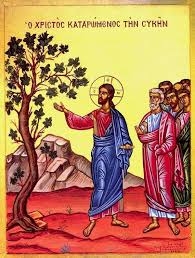 fixed breakfast!) Jesus saw a fig tree with no fruit on it, and he cursed it. Matthew says it immediately withered. Mark says that evening on the way back they found it withered.
fixed breakfast!) Jesus saw a fig tree with no fruit on it, and he cursed it. Matthew says it immediately withered. Mark says that evening on the way back they found it withered.
Why would the Lord do that to an innocent tree? As a symbol of the results of not “bearing fruit”. (Read the parables below.) The key is in the next line: “If you have faith you can say even to this mountain ‘Be cast into the sea’ and it will happen.” What was the mountain in front of them? Mount Zion, the “temple mount”, the center of Judaism. The fig tree was the Jewish nation which would now reject Jesus their Messiah and be “cast into the sea”, so to speak. It would wither like the fig tree.
When they got to Jerusalem, Jesus described the destruction of Jerusalem and the Jewish nation by the Roman army which would take place forty years later. We’ll hear about that at morning services early this week.
He came to the temple. The authorities now began a coordinated last attempt to discredit this “fake Messiah”, lest he lead a rebellion and the nation be destroyed. So the questions: “Who gave you authority to do these things?” Christ very smoothly turned it on them: “I will tell you if you first answer me a question. Was the Baptism of John from God or from men?” They hesitated. If we say from men, the people will turn on us for they revered John. But we can’t say from God because John said Jesus was the Messiah. They answered, “We do not know”. Jesus responded, “Then neither will I tell you by what authority I do these things”. Their attempt didn’t work.
We’ll hear more about the confrontation tomorrow evening. There is no reason to think that the Gospels give us the whole of it.
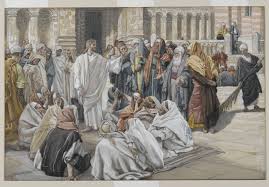 Then Jesus took charge of the questioning: A man told his sons to go work in his vineyard. One said Yes but didn’t do it. The other said No but did it. Which did his father’s will? That was obvious to them: the one who said No but did it. Jesus responded: I say to you, You say Yes to God, you practice your religion, but when John came and spoke the truth about me you rejected him – while the sinners, tax collectors and harlots who aren’t “religious”, who say No to God, they believed John. Despite all your pious words you are not doing God’s will.
Then Jesus took charge of the questioning: A man told his sons to go work in his vineyard. One said Yes but didn’t do it. The other said No but did it. Which did his father’s will? That was obvious to them: the one who said No but did it. Jesus responded: I say to you, You say Yes to God, you practice your religion, but when John came and spoke the truth about me you rejected him – while the sinners, tax collectors and harlots who aren’t “religious”, who say No to God, they believed John. Despite all your pious words you are not doing God’s will.
Then came Christ’s parable of the vineyard, a fairly common Old Testament image of the Jewish nation. The Landowner who established their nation and then went off to a far country is God. The vinedressers are the Jews. God sent his servants the prophets to collect the fruits, but they beat some, killed others. Now the parable moves into the present: Finally the Landowner sent his Son, and they killed him. So what will the Owner do to those vinedressers? His hearers didn’t get the point: This was about them. They answered: He will destroy them and give the vineyard to others who will give him the fruits. Jesus said: “I tell you the Kingdom of God will be taken away from you and given to a nation which will produce the fruits of it.”
And so it was: The rulers of old Israel arranged the murder of the Son of God, their own Messiah, and the people (almost all of them) followed, and the kingdom was taken away from them. The Church is now the new Israel, the true Israel.
Herein lie both a promise and a threat. The promise: The Church, by the promise of Jesus Christ, is eternal. The Church is the risen Body of Christ. He said the power of death will never prevail against his Church. If we produce the fruits – faith, love, joy, gentleness, self control, obedience – he will never desert us. And the threat: No part of the Church on earth is eternal. If we are unfaithful, if we here and now do not produce the “fruits of it” he will take the Kingdom away from us and give it to people who will. As John the Baptist had said, “If God needs sons of Abraham, he can raise them up from these stones.”
Holy Monday Morning: Liturgy of the Presanctified Gifts
Gospel Reading: Matthew 24:3-35
In the Gospel today and tomorrow we hear Jesus’ teachings about the Last Things. Matthew says on Monday the disciples (small town boys from up north) were marveling at the great buildings in Jerusalem. Jesus said, “I tell you, the time is coming when not one stone will be left upon another.” Later as they sat on the Mount of Olives the disciples asked, “When will these things be? What will be the sign of your coming?” They are sure now that he is Messiah who will 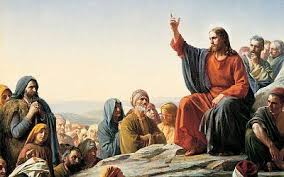 return in glory.
return in glory.
So Jesus began a long description of the End Times. This passage is about both the destruction of Jerusalem and the end of the Jewish nation which would take place forty years later, and also about the End of the Age. The two themes are intermingled here – at least as remembered in the Gospel writers’ minds.
Christ says he does not know when he will return, that only the Father knows. So when people tell us the date of his coming – which the Lord himself did not know – ignore them. Why should Christ who is God who knows all things not know this? We don’t know. Many in the first generation hoped it would be soon. It was not.
And still we wait. That used to distress me. But then I thought: If he had come earlier, none of us now alive would ever have existed, all the people I love so much. We would never have been able to live eternally with the Lord and with each other. So… thank God he has been so “slow”. Or has he? “Beloved, do not forget this … that with the Lord one day is as a thousand years, and a thousand years as one day. The Lord is not slow concerning his promise, as some count slowness, but is long-suffering toward us, not willing that any should perish but that all should come to repentance.” 2 Peter 3:8-9
Back to the story. First Jesus gives a warning: Do not be deceived by those who say “I am the Christ”, I am the Savior. I think this applies to any who think they’ve got all the answers. Not only crazy people who think they’re God, but also any who make absolute claims: religious leaders, politicians, philosophers, economists and their systems, any who say they alone know how to save the world. There is one Savior, Jesus of Nazareth.
He said: Do not be troubled by the state of the world. Always there have been wars, famines, diseases, earthquakes. They do not mean the End is near. Then specific prophecies: You will be delivered up to tribulation, killed, hated by all. This has been fulfilled many times, certainly in the first generation. You know what happened to the Apostles. “The Gospel must first be preached in all nations.” That also happened in the first generation. The Apostles went to the ends of the known world. And in modern times the Gospel has been proclaimed in all nations – which means…?
Then come prophecies of the destruction of Jerusalem, the “abominating sacrilege” in the holy place. When the Romans conquered Jerusalem in the year 71, before they leveled the city Emperor Titus, just to rub it in, put pagan idols in the holy of holies in the temple. So this also has been fulfilled, as have the prophecies of the destruction of Jerusalem and the flight of the residents. The historian Josephus wrote of the horrors of the seven month siege – people starving, reduced to cannibalism. A multitude died, the rest scattered in all directions: the end of the Jewish nation, as Christ had predicted.
Then suddenly the Lord is speaking about his Second Coming. If anyone says: “Look, here is the Christ or there”, do not believe it. When he comes it will be like lightning flashing from one end of 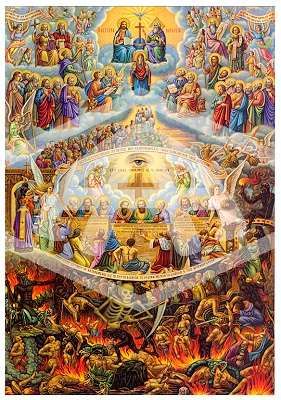 the world to the other, like eagles gathering. That is, it will be obvious. If you have to ask “Is it him?” it isn’t.
the world to the other, like eagles gathering. That is, it will be obvious. If you have to ask “Is it him?” it isn’t.
There will be signs in the heavens: sun and moon darkened, stars falling, cosmic powers shaken. Some think it will be an angelic invasion into our fallen world from the unfallen world out there, to destroy the demonic spiritual virus that has sickened us on earth. Or will it be a cosmic catastrophe of some sort? Jesus, looking ahead, says only that then the Son of Man will appear on the clouds of heaven in great glory, and he will gather his faithful from the ends of the world. When these things happen, he says, then, not before, you will know he is near, at the gate.
He concluded: “This generation will not pass away till all these things come to pass.” Did all these things then come to pass in the generation? The destruction of Jerusalem, yes. The return of Christ in glory, no – but he couldn’t have meant that to be taken literally, since he had just said he did not know the time of the End. So in another way, yes: In Christ, in his Incarnation, in his Resurrection, in the Church, the End of the World has already come. The final destination of the world has doubled back into time, and the New Age is here. Christ began his ministry saying, “The Kingdom of God is at hand” – for he is at hand. “Behold, I am with you always to the end of the age.” In the Divine Liturgy of Saint John Chrysostom we thank God for already giving us “his Kingdom which is to come”.
“Heaven and earth will pass away, but my words will never pass away.” Put those words on the lips of any other human being who has ever lived, and that’s crazy talk. You see why they accused him of blasphemy, making himself “equal with God”. What mere man has a right to talk like that? Who does he think he is? Who indeed.
Tomorrow’s afternoon’s Post: Holy Monday evening Matins and Holy Tuesday morning Liturgy of the Presanctified
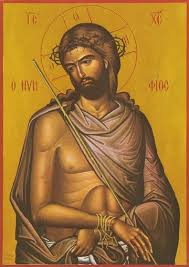
Dear Father Bill – thank you for your blog. It is such a wonderful treat to read, especially when being home with the cold.
The Gospel will be preached to all nations, then then end… This still hasn’t happened. The world was a lot bigger than the Apostles knew it to be. This has to be a least one reason for the delay of the Parousia.
But in recent times the Gospel HAS been proclaimed to all nations or at least almost all – unless we count whatever may exist in outer space. Which means…?